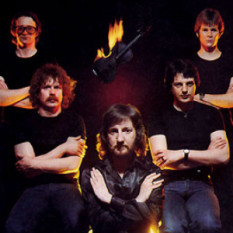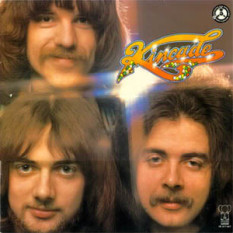In 1988, ELO drummer Bev Bevan approached Jeff Lynne wanting to do another Electric Light Orchestra album. After Lynne declined to participate, Bevan intended to continue the band without him. Lynne objected, and lawyers were soon involved. The legal agreement reached between Lynne and Bevan resulted in Electric Light Orchestra officially disbanding and Bevan forming a new band, initially called Electric Light Orchestra Part Two. Bevan recruited longtime ELO string conductor and co-arranger Louis Clark into his new band, along with Eric Troyer(keyboards and vocals), Pete Haycock (guitar and vocals) and Neil Lockwood (guitar and vocals). ELO Part Two released a self-titled album in 1991 which featured former ELO violinist Mik Kaminski on one track. The album was intended to harken back to ELO's classic sound of the mid-to-late 1970s, but opinion is strongly divided as to whether or not it succeeded. The first tour featured the band performing live with The Moscow Symphony Orchestra, and was well-received in the UK. Approximately two-thirds of the songs performed were ELO hits. The concert in ELO's home town of Birmingham was captured on video and on the live album with the long-winded title Performing ELO's Greatest Hits Live Featuring The Moscow Symphony Orchestra. Kaminski, former ELO cellist Hugh McDowell, and former ELO bassist Kelly Groucutt were part of the live band, with Groucutt sharing lead and backing vocals with Troyer, Haycock and Lockwood. Kaminski and Groucutt were initially appearing as guest artists from another ELO offshoot band they had formed called OrKestra, but eventually they ended their own band and joined ELO Part Two full-time. McDowell's tenure with the band was short, as some personality conflicts emerged and he was let go. Plans to tour the USA with the MSO were cancelled, as costs became prohibitive.
The band continued to tour Germany and the UK in 1992 with Louis Clark playing keyboards to duplicate the strings of the absent orchestra. In 1993, Pete Haycock and Neil Lockwood left the band, and were replaced by guitarist/vocalist Phil Bates, who had been in the band Trickster which were the opening act for ELO's 1978 world tour. An ambitious world tour was undertaken by ELO Part Two in 1993, including dates in the USA and Eastern Europe.
Now a six-piece band with a slightly altered name, Electric Light Orchestra Part II recorded a second studio album, Moment Of Truth, which was released in 1994. The album was not a commercial success, but was generally considered superior to their first album. The band continued its rigorous tour schedule over the following years, sometimes augmenting the core band with a backing orchestra. On these occasions, they took only a small number of string players on the road and added local musicians to the orchestra at each venue to cut down costs. This was one of the features that distinguished ELO Part II from ELO, as the original band never played live with orchestral accompaniment. Another live album with orchestral backing was recorded in Sydney, Australia in 1995 and was released the following year in Germany as a double album One Night, and the year after that in the USA as a single album One Night - Live In Australia. The band sold the master tapes of this album, and it has since been remixed, remastered, and re-released under so many guises that the original CD may prove difficult to acquire.
Bates remained with the band until 1998 and was replaced by Parthenon Huxley (guitar, vocals). As the decade progressed, the percentage of original material in the band's set list tended to decrease, and their concerts often consisted of 90 per cent ELO songs. Bevan started to get frustrated, especially with their inability to break through in the United States, where the band sometimes performed in bars or at festivals where they were not the centre of attention. In November 1999, Bevan played his last show with the band at the Sands Hotel in Atlantic City.
Unlike the original ELO, which were under the creative control of writer/producer Lynne, ELO Part II were often portrayed as more of a democracy, with various band members sharing songwriting and lead vocals. But Bev Bevan was still the leader of the band, and he issued a press release in early 2000 indicating that ELO Part II were disbanded. .
All albums
You can find information through the best music search engine - Muzlan.top 😊All materials on request "Electric Light Orchestra Part II" are available on page Electric Light Orchestra Part II
Yes of course. You can listen tracks on the page Electric Light Orchestra Part II
Yes of course. You can download tracks on the page Electric Light Orchestra Part II
This page is found by queries: Electric Light Orchestra Part II mp3 download, Electric Light Orchestra Part II free download, Electric Light Orchestra Part II songs download, Electric Light Orchestra Part II flac, Electric Light Orchestra Part II remix


